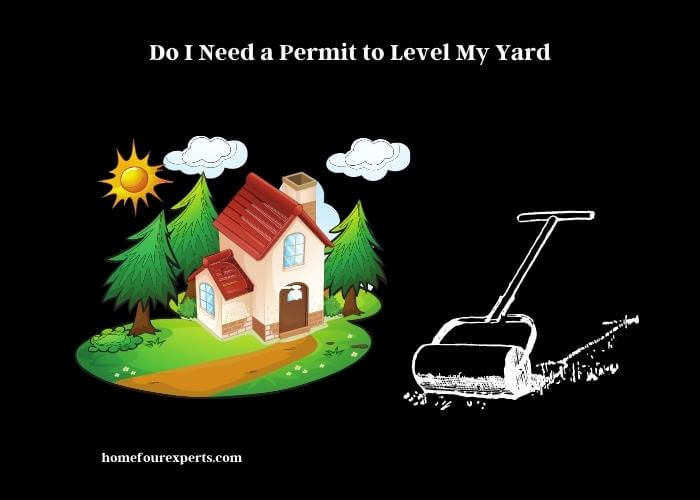Published on: July 16, 2023
Written by Eric Devin / Fact-checked by David Rowan
Yes, a permit may be required to level your yard. This largely depends on the specific rules and regulations in your local area.
Certain locations necessitate a building permit for landscaping projects that involve significant changes to the land, like leveling or grading. A grading permit is often required for substantial modifications, which would certainly include altering the contour of your yard. The purpose of this is to ensure that your project doesn’t inadvertently affect drainage patterns or cause erosion problems for you or your neighbors.

Nonetheless, there are some tasks a homeowner can accomplish without a permit. Small-scale landscaping work, the placement of patio pavers, or the addition of a gravel driveway generally don’t require official authorization, unless they drastically change the existing terrain or drainage situation.
In terms of timing, the optimal period to regrade a yard is during the dry season, when the soil can be easily manipulated and won’t be disrupted by heavy rainfall.
Lastly, the person best suited for the job of yard regrading is a qualified, experienced landscape contractor or earthwork professional. They will have the right knowledge and tools to perform the job safely and efficiently, while also being aware of any permit requirements in your area. Always make sure to verify if a permit is needed before embarking on a major landscaping project to avoid potential legal issues and fines.
Regulation and Compliance
Permit Necessities
Some locations necessitate permits for significant landscaping endeavors such as leveling a yard. This is largely based on local ordinances and zoning laws, which are designed to protect both the homeowner and the neighborhood from negative consequences like incorrect drainage or soil erosion.
Homeowner’s Tasks
Permit-free Activities
Certain tasks can be performed by homeowners without the need for an official permit. These usually include minor landscaping changes that don’t dramatically alter the land’s contour or interfere with existing drainage systems. Laying patio pavers or creating a gravel driveway generally fall into this category.
Best Practices
Ideal Times for Yard Regrading
The dry season typically offers the best conditions for regrading a yard. It provides an environment where the soil can be easily manipulated and is less likely to be disrupted by heavy rainfall or other weather-related issues.
Hiring Professionals for Yard Levelling
Advantages of Hiring Professionals
Enlisting professionals for yard leveling comes with numerous benefits. Expertise is a significant advantage. Professionals have the requisite skills, experience, and equipment to handle all types of yards. They can efficiently solve unforeseen issues that might arise during the leveling process.
Choosing the Right Company
Make sure to select a reputable company. Look for positive reviews, check their licensing, and confirm they have proper insurance coverage. A good professional company will also help navigate any necessary permit applications and regulations.
The Cost Implication
The expense of hiring professionals is often a concern. However, their efficiency and precision can save potential expenses associated with DIY mistakes. Furthermore, they offer services that add long-term value to your property.
Permit Requirements for Yard Projects
| Project Type | Permit Required (Y/N) | Notes |
| Yard Leveling | Depends on local regulations | Check with local authorities |
| Patio Pavers | Generally, No | Unless drastically changing terrain |
| Gravel Driveway | Generally, No | Unless drastically changing terrain |
| Major Landscaping Changes | Yes | Always check local regulations |
It’s paramount to confirm whether a permit is required before starting any major landscaping project. This is to avoid any potential legal implications or fines that might occur if regulations are not adhered to properly.
Tips for Dealing with Permit Denial
The Appeal Process
Your application for a yard leveling permit may be denied for various reasons. Although it may feel disappointing, there are still avenues to consider. You have the option to lodge an appeal. While preparing your appeal, remember to remain courteous and professional. Review the reasons for the permit denial carefully, then prepare a detailed argument addressing each point.
Engaging with Local Authorities
Stay proactive in your communications with local officials. Regular interactions can provide more insight into their concerns and offer an opportunity to provide clarity or present new information that might help overturn the initial decision.
Evaluating Other Options
Don’t restrict yourself to one solution. If the permit denial seems insurmountable, consider alternate methods of achieving your desired outcome. Consulting with a professional landscaper or architect can present you with other viable yard improvement options that may not require a permit.
DIY Yard Leveling: Pros and Cons
| Pros | Cons |
| Lower Costs: DIY yard leveling can be a more budget-friendly option as it eliminates labor costs. | Time-Consuming: Without professional help, the process can be time-consuming, taking away valuable time from other activities. |
| Control: Doing it yourself allows complete control over every detail of the project. | Difficulty: The job can be physically demanding and requires a fair amount of skill and knowledge to be done correctly. |
| Satisfaction: There’s a sense of accomplishment and satisfaction that comes from completing a project with your own two hands. | Risk of Mistakes: Without the proper experience or training, there’s a higher chance of mistakes that could impact the project’s outcome or even lead to potential legal issues. |
FAQs
What Projects Require a Building Permit?
Building permits are generally required for significant changes to a property such as new construction, extensive renovations, and major landscaping changes like yard leveling or grading.
Is Leveling My Yard with Sand Under Pavers a DIY Project that Requires a Permit?
Leveling your yard with sand under pavers is a DIY project that doesn’t typically require a permit. However, it’s important to follow local building codes and regulations. As for the amount of sand needed, it depends on the size of the area and the depth of sand required. Research “how much sand for pavers” for accurate measurements.
Can I Remodel My Own House Without a Permit?
While you can undertake minor renovations without a permit, major alterations often require one. It’s best to check with your local building department to avoid potential penalties.
Do I Need a Permit to Make a Driveway?
In most cases, yes. The creation of a driveway typically involves significant changes to the land and can impact drainage, making a permit necessary.
Does Landscaping Require a Permit?
Depends on the extent of the landscaping. Minor changes may not require a permit, while significant alterations such as leveling a yard or changing the land’s contour generally do.
What is a Grading Permit?
A grading permit is an official authorization needed to make substantial changes to a property’s land, such as leveling a yard or changing its drainage patterns.
Do I Need a Permit to Install Pavers?
Typically, the installation of pavers does not require a permit unless it dramatically alters the terrain or affects drainage systems.
Do I Need a Permit for a Gravel Driveway?
It largely depends on your local regulations. While a gravel driveway might not generally require a permit, it’s best to confirm with local authorities to ensure compliance with all rules and regulations.
Read more:
- Can You Spray Paint Landscape Bricks?
- Can You Attach a Metal Building to a House: A Practical Guide
- Can I Add Another Driveway to My House? – Know Your Local Regulations
About This Writer

Hi, I am Eric Devin and I am a professional interior architect. Since childhood, I've always enjoyed DIY projects! And, I have loved to solve simple household problems using essential tools and equipment. I have also acquired a lot of information about basic household tools settings by working with contractors.